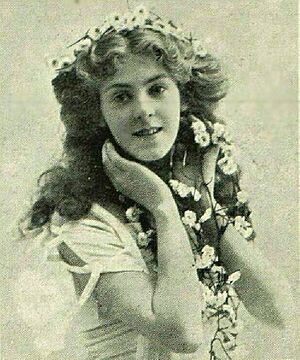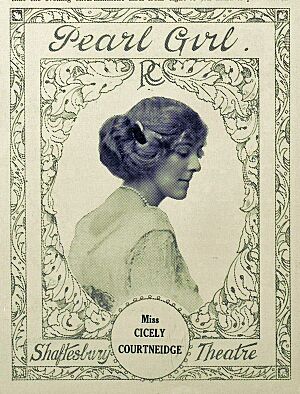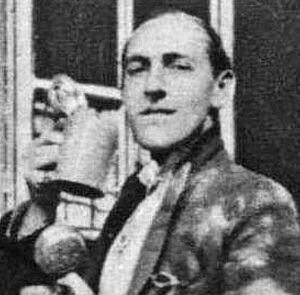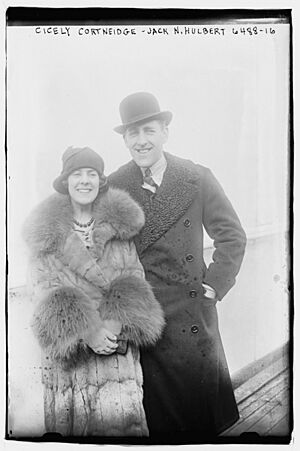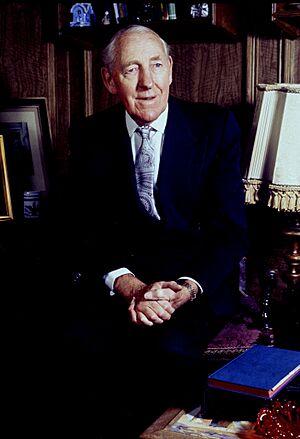Cicely Courtneidge facts for kids
Quick facts for kids
Cicely Courtneidge
|
|
|---|---|
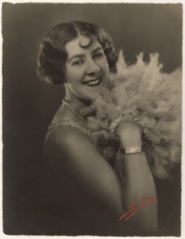
Courtneidge in Lino Lady, 1925.
|
|
| Born |
Esmerelda Cicely Courtneidge
1 April 1893 Sydney, New South Wales, Australia
|
| Died | 26 April 1980 (aged 87) |
| Occupation |
|
| Spouse(s) |
Jack Hulbert
(m. 1916; died 1978) |
| Parent(s) |
|
Dame Esmerelda Cicely Courtneidge (born April 1, 1893 – died April 26, 1980) was a famous actress, comedian, and singer. She was born in Australia but became a British star. Her father, Robert Courtneidge, was a producer, and Cicely started acting in his shows when she was just 16. She quickly moved from small roles to big ones in musical comedies.
When World War I began, her father faced some challenges. Cicely then started performing in music halls, which are like variety shows, and became a skilled comedian. In 1916, she married actor Jack Hulbert. They became a very successful team, working together on stage and in movies for 62 years until Jack passed away.
Cicely also starred in many British films in the 1930s and even one in Hollywood. This work helped her earn a lot of money. She and Jack also recorded songs. During World War II, Cicely entertained soldiers and helped raise money for them. Later, she had a long run in the play Under the Counter. Another big success was her role in Ivor Novello's musical Gay's the Word in 1951.
After the mid-1960s, Cicely focused on plays that weren't musicals. She performed in London and on tour. In 1971, she celebrated 70 years of acting while performing in her last London play. She continued to work for five more years before retiring.
Contents
Life and Career of Cicely Courtneidge
Early Acting Years
Cicely Courtneidge was born in Sydney, Australia. Her father was touring there with a theatre company. Her family moved back to England in 1894. Her parents were the producer and actor Robert Courtneidge and Rosaline May Adams, who was also an actress.
In 1901, at age eight, Cicely first appeared on stage. She played a fairy in her father's play A Midsummer Night's Dream in Manchester. Cicely went to school in England and Switzerland. When she was 15, she decided to become an actress, and her parents supported her.
Her father gave her small, innocent roles in his plays. Her first London show was in the comic opera Tom Jones in 1907. Her first main role was Eileen Cavanagh in the musical comedy The Arcadians in 1910. She then starred in The Mousmé (1911), another play her father helped write.
Some people thought she got big roles only because she was her father's daughter. However, The Times newspaper praised her "pretty impudence and roguery."
Cicely kept starring in her father's shows. In 1913, she played Lady Betty Biddulph in The Pearl Girl. Jack Hulbert, who would later become her husband, was also in the cast. In 1914, Cicely and Jack starred together in The Cinema Star. This show was very popular until World War I started in August 1914, which stopped its run.
Cicely and Jack got engaged in 1914. Her father wanted them to wait two years before marrying, so they married in February 1916. After the war began, Jack joined the army. Cicely continued to perform in her father's shows, but some of them were not successful.
These failures meant her father stopped producing for a while. No other producers offered Cicely main roles in musicals. So, she started performing in variety shows, which are like music halls. This was the start of her new career as a comedian. She later said, "Music hall is the toughest thing in the world." But she became very good at it.
Working with Jack Hulbert
Cicely realized she was better at comedy than romantic roles. She continued in variety shows and started performing in pantomime in 1918. She and Jack Hulbert planned to work together in funny shows, revues, and musical comedies. Their first revue, Ring Up, was in 1921.
In 1923, Cicely and Jack appeared in The Little Revue, which Jack produced. This show was very successful, and they made five more popular revues over eight years. These shows played in London and toured the UK. In 1925, they performed their revue By-the-Way on Broadway in New York.
One of Cicely's most famous comedy acts was in Clowns in Clover. It was called "Double Damask," where her character, Mrs. Spooner, got tangled in funny tongue-twisters. A recording of this sketch from 1932 is still considered a classic comedy today.
In 1931, Cicely and Jack faced a big problem. They had financial difficulties and lost a lot of money. To earn enough to pay back everyone, they decided to work separately for a while. The growing film industry allowed them to earn large amounts of money. Cicely appeared in 11 British films and one Hollywood film in the 1930s. She found she could earn more in eight weeks of filming than in a whole year in the theatre.
They still managed to work together on some films, like The Ghost Train (1931) and Jack's the Boy (1932). During this time, Cicely and Jack also made many gramophone records. Cicely recorded songs and sketches, including her famous "Laughing Gas" sketch.
Cicely did not return to the theatre until October 1937. She starred in the musical Hide and Seek. Cicely and Jack finally reunited on stage in Under Your Hat, a spy story. This was their favorite show together. It ran until 1940 and was also made into a film.
1940s and 1950s Success
During World War II, Cicely spent a lot of time entertaining soldiers. In 1941, she put on a three-hour show every night to raise money. She then formed a small group and traveled to places like Gibraltar, Malta, and Italy to perform for the troops and in hospitals. She also toured in shows like Hulbert Follies (1941) and Full Swing (1942) with Jack.
After the war, Cicely had a long run in Under the Counter, a comedy produced by Jack. The play was about getting luxury goods during tough times, and it was very popular in Britain. It ran for two years. When they took the play to New York, it only lasted three weeks because American audiences didn't understand the humor. However, it did well in Australia.
After returning to England, the Hulberts performed in a new musical, Her Excellency (1949). In 1950, Cicely starred in one of her biggest successes, Ivor Novello's musical Gay's the Word. Critics loved her performance. The show opened in London in February 1951 and ran until May 1952. In 1951, she received the CBE honor.
In the 1950s, Cicely started performing more in plays and revues that weren't musicals. She appeared in shows like Over the Moon (1953) and The Bride and the Bachelor (1956).
Later Years and Retirement
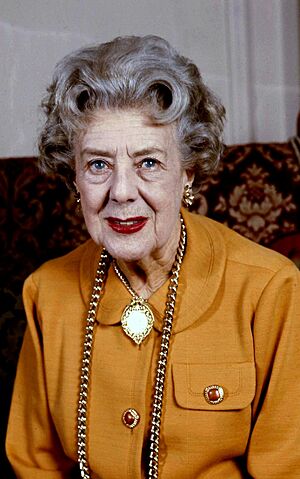
In the early 1960s, Cicely performed in many plays in London and other cities. She also appeared in pantomimes and old music hall shows. In 1962, she gave what she thought was her best film performance in The L-Shaped Room. She played an elderly woman living in London. The Times newspaper called her performance a triumph. In 1962 and 1963, she and Jack starred in a BBC radio comedy called Discord in Three Flats.
In 1964, Cicely took on the role of Madame Arcati in the musical High Spirits. This was a difficult time for her. The show's director, Noël Coward, and Cicely often disagreed during rehearsals. The show received bad reviews, and so did her performance.
The last London play where Cicely and Jack appeared together was Dear Octopus in 1967. Cicely received excellent reviews for her role. In 1969, Cicely started working in television. She played "Mum" in the first season of the comedy show On the Buses. Around 1970, Cicely and Jack performed in a play called Oh, Clarence! in South Africa.
Cicely's theatre work in the 1970s included tours of plays like Agatha Christie's The Hollow and Breath of Spring, both with Jack. In 1971, Cicely starred in the comedy Move Over, Mrs Markham. During this play, her last in London, she celebrated 70 years on stage. In 1972, she received the DBE honor, becoming a Dame. In 1976, she and Jack toured in a show about their lives called Once More With Music.
One of her last performances was at a special royal show in June 1977. It celebrated the Queen's Silver Jubilee and featured many famous actors.
Jack Hulbert passed away in 1978. Cicely Courtneidge died two years later, shortly after her 87th birthday, in a nursing home in London. She was survived by her daughter.
Filmography
Films with Jack Hulbert
| Year | Title | Role | Notes | Ref. |
|---|---|---|---|---|
| 1928 | British Screen Tatler No. 10 | Short | ||
| 1930 | Elstree Calling | Herself | ||
| 1931 | The Ghost Train | Miss Bourne | ||
| 1932 | Jack's the Boy | Mrs. Bobday | ||
| Happy Ever After | Illustrated Ida | |||
| 1933 | Falling for You | Minnie Tucker | ||
| 1937 | Take My Tip | Lady Hattie Pilkington | ||
| 1940 | Under Your Hat | Kay Millett | ||
| 1955 | Miss Tulip Stays the Night | Miss Tulip | ||
| 1960 | The Spider's Web | Miss Peake | ||
| 1972 | Not Now Darling | Mrs. Harriet Frencham | Final film role |
Other Film Roles
| Year | Title | Role | Notes | Ref. |
|---|---|---|---|---|
| 1933 | Soldiers of the King | Jenny Marvello / Maisie Marvello | ||
| 1934 | Aunt Sally | Sally Bird / Mademoiselle Zaza | ||
| 1935 | Me and Marlborough | Kit Ross | ||
| The Perfect Gentleman | April Maye | |||
| Things Are Looking Up | Cicely Fytte / Bertha Fytte | |||
| 1936 | Everybody Dance | Katharine "Lady Kate" Levering | ||
| 1962 | The L-Shaped Room | Mavis | ||
| 1965 | Those Magnificent Men in Their Flying Machines | Muriel – Colonel's Wife | uncredited | |
| 1966 | The Wrong Box | Major Martha |


